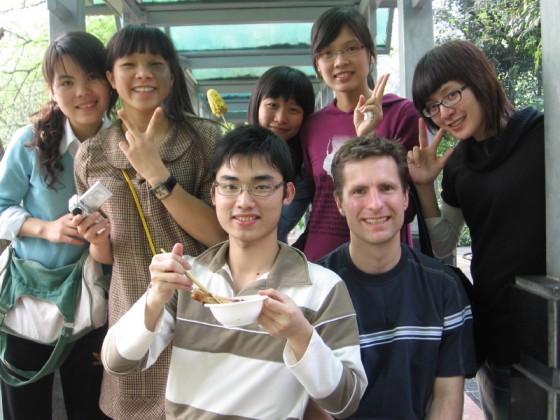June 25 - Professor Eric Scott Juhnke recently accepted an interview with the English News Website and met with us at El Rey Du Cafe on north campus after dismissing his American Culture class of English Faculty juniors Language for the day.
Professor Juhnke explained that his family name is German and that his ancestors had moved to America from Germany in the 1870s. Influenced by his father and uncle, who were both American historians, Eric first became fascinated with history as a boy. Earning a Ph.D. in history from the University of Kansas in the year 2000, Eric is now a professor at Briar Cliff University in Sioux City, Iowa. He came to China last February to teach at GDUFS for one semester on a Fulbright Scholarship. The Fulbright program works to increase mutual understanding between the people of the United States and other countries through intellectual exchange.

Professor Juhnke with his students at a barbecue
Eric firmly disagrees with the common assumption that history consists merely of the memorization of dates and names of dead people. With a gleam in his eye he explained that the stories, personalities, and riddles of history always make for excellent entertainment. As for the importance of studying history, he says it helps develop skills in critical thinking as well as oral and written expression.
We are all drawn to the study of history because it provides us with a sense of identity. In other words, we would feel lost or rootless without knowledge of our past, which is true for individuals, communities, and even nations.
During his lessons at GDUFS Eric conveys the importance of history and history study using films, music and PowerPoint presentations to present history as narrative. He claims that names and dates are not essential in gaining the overall importance of history.
Returning to the United States at the end of this semester, Eric said that he is eager to share with his students his experiences in China. He says the five months he has spent at GDUFS and in China have enhanced his knowledge and inspired his teaching of history.

Eric and his family taking in the view from the Great Wall
This is not Professor Juhnke's first visit to China. He was here with his wife Jodi in 2002 and 2005 when they came to adopt two baby girls. With the help of an international adoption program, Eric and Jodi went to Guizhou in 2002 to get their first daughter Megan. In 2005 they completed the family by going to Chongqing for their second daughter Lily.
While Eric has been busy teaching at GDUFS, his two girls are enrolled in an international school and are getting a taste of the culture of their ancestors. The pride and love Eric feels for his two daughters was evident as he talked about them. He encourages them to learn more about Chinese culture and looks forward to more visits to China in the future.
Because he is a scholar of African American history, we asked Professor Juhnke whether Barack Obama's election as president of the United States was a breakthrough in American history. He answered that Mr. Obama's election represents a milestone in the African American civil rights movement. According to recent polls, African Americans are more hopeful about race relations in the US than ever before. However, he also pointed out many problems have yet to be solved, including discrepancies between the income levels of blacks and whites, life expectancy, educational achievement, and prison incarceration rates. Racism does still exist, although in less virulent forms than in past decades.
As a concluding point, he believes that the election of Mr. Obama has reinvigorated the longstanding American belief that any child in the US can grow up to become president. "But what was remarkable in the election was how little Obama's race was at issue.The suffering economy and the perceived failures of the Bush Administration overshadowed everything else," he said.
A person's actual abilities account for one's achievement. As Martin Luther King, Jr. said in his famous speech, "I have a dream that my four little children will one day live in a nation where they will not be judged by the color of their skin but by the content of their character." And so it was that during a dark time in American history, the content of Barack Obama's character outshone the issue of his race and led him to be chosen as president.

A family day can be tranquil at times
Professor Juhnke went on to provide insight to American culture, allowing us to see the United States as a nation of endless potential. We asked him, "Do you think American society is tolerant of multiple cultures? How do people from around the world merge into this melting pot?" He answered immediately, yet thoughtfully, "The melting pot image is no longer in vogue in American society. Instead, most scholars, and I think non-academics as well, embrace the concept of American pluralism. The more appropriate simile would be the salad bowl, where each vegetable or lettuce leaf has its own distinct flavor and texture. Overall, despite the isolated occurrences of intolerance, racism, and insensitivity, I think Americans are very accepting of multiple cultures."
America is a society of multiple cultures, and so we asked Professor Junhke what aspects of American society can people from the world look at to discover the essence of American values. He replied that first people should understand that Americans rarely speak with one voice. He explained, "Individual Americans, in fact sometimes the majority of Americans, often disagree with or are even unaware of their leaders' foreign policy positions and directives around the world." In a nutshell, American society cannot be summarized in simple terms such as "Americans prefer such and such," and "American always do this and never do that."

Eric and his daughters greeting a family of pandas
For students interested in American history, Eric suggested searching online for course syllabi posted by history professors for public access.
We learned through our brief conversation with Professor Juhnke about several aspects of life and the world: adoption is an example of true love transcending cultural borders, cultural immersion is an eye-opening, knowledge-expanding experience, and American society and values are worth studying carefully to gain an understanding of cultural pluralism and tolerance.
Photos provided by Eric
Related News
Photos
More>>history
- Guangzhou Witnesses Asian University Presidents Forum
- CPC-Secretary Sui Visits South-American Institutes and Received Honors
- GDUFS Vice President Visit Partner Institutions in Germany and the UK
- Vice President of University of Birmingham Visits GDUFS
- Party Secretary Xu Guobin Visits Northern European Institutes





